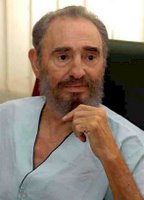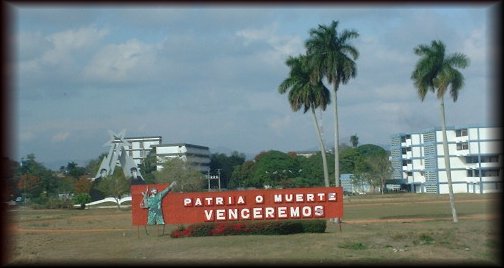well, not really ... he has a whole newspaper that prints whatever he wants to print. and so King Fidel prints his note to the people of Cuba, along with pictures of himself looking quite the old Conquistador that he is by blood. even after losing quite a lot of weight, he looks better than your average Cuban in the streets, who has precious little to eat.

king fidel
at any rate, this past September 4, the message was that King Fidel was getting better, in control, and working his illusions.
because, ultimately, his "note" to the Cuban people is a work of illusion. self-illusion, perhaps (in that he thinks the people of Cuba actually love him), but one doubts it.
no, it's rather just plain illusion, trying to convince the people of Cuba that they DO IN FACT love him and care about him getting better rather than dying. a double illusion, perhaps: trying also to convince the world that the people of Cuba care for him.
it's an interesting note, which I reproduce in full. the original in Spanish, as published by the party-mouthpiece Granma
can be found here. The original text is in italics; my comments are underneath.
Dear countrymen:In recent days, certain filmed images and various photos were published, and these pleased our people very much.Note he doesn't mention whose images and photos. He could only be talking about himself. Likewise, the people of Cuba can only be thinking of him at this time. Conceit? Hubris? Wishful thinking? Subtle conditioning that, in fact, they must not be thinking of anyone else?
King Fidel then says that the images pleased "our" people very much. Very nice slip into the royal "we." One wonders, again, whether the people are being told that the images pleased them, whether this is the reality or not. In other words, officially, the people were pleased.
That's all that counts in Cubaland.
Some thought, with reason, that I was a bit thin, but that was the only unfavorable element. I am very glad that they had perceived it thus. This allows me to send you certain recent photos, and at the same time, inform you than in a few days I lost 41 pounds.That last sentence is bound to become an icon of grim Cuban popular humor. "How does Fidel lose 41 lbs? He gets gastric surgery. How does the average Cuban lose 41 lbs? He picks up his ration book and tries to find food in the stores." Or something like that ...
Again, the message: you care that I am thin. This is important to you, trying to feed yourselves and your wives and husbands and children and parents ... but put aside your own malnutrition ... I was a bit thin, but it wasn't that bad.
Note his shift from third person ("some thought") to second person ("send you certain recent photos"). Now King Fidel is speaking to each and every Cuban that reads the note: I am sending YOU recent photos. I care about YOU. Therefore, you should care about ME.
I add that only recently my last suture was taken out, after 34 days of convalescence.Like the Cuban people really care. Oh wait... the point is that this stuff is supposed to be what they care about. They are being told that this is important; this is what they should concern ourselves with. This is the tone they should adopt, a hushed, caring tone: "Fidel was convalescent for 34 days. Then they took the last suture out."
Not for one day, not even the most difficult ones since July 26, did i stop trying to ease the adverse political consequences of such an unexpected health problem.Ah, yes... a reference to the anniversary of Fidel's suicidal attack against the second-largest army garrison in Cuba, on July 26, 1953. These are the good old days. These are the days Fidel wants the people to remember: when he was a revolutionary in his 30's, not a dictator in his 80's.
Also of note: he calls his health problem "unexpected." In other words, he implies it's not a long-running illness, not something he has dealt with for quite a while. No, it's unexpected.
He does not elaborate, but the implication is that this is a passing problem, an unexpected illness from which one recovers, not cancer or something of that nature. Note he doesn't say that. He just implies it.
The result [of my efforts] is that, for my tranquility, I made advances on several important issues. I can tell you that as to the book One Hundred Hours with Fidel, by [Ignacio] Ramonet. for which I was revising in detail each of my responses on the days in which I became ill, is practically finished, and soon it will be published, as I promised.Oh solipsism. Nothing exists outside King Fidel's ego. From his sick bed, King Fidel assures his captive audience that his illness has but little delayed the publication of a book ..... about King Fidel. I am sure the publication date of that book is what every Cuban wants to know about. Of course, it isn't, so they must be told that it is.
Despite [my efforts] I did not fail to comply strictly with my duties as a disciplined patient. I can affirm that the most critical moment is over. I am recovering with a satisfactory rhythm. In the next few days I will receive distinguished visitors; that does not mean that each activity will be accompanied by film or photographs, though news of each such activity will be offered.King Fidel the soldier: he carries out his duties; he has a duty to heal; even in his illness he serves the Cuban people by carrying out his duties to heal. This is both another reminder of his glory days as a soldier and an imposition of their own duty on the Cuban people, which is to follow their leader who is trying so hard to recover the better to lead them.
We all should understand that it is not convenient to offer systematic updates regarding, nor to provide images of, my health. We all should understand equally, with realism, that the time for a complete recovery, whether we want to or not, will be prolonged. At this moment, I am not in a hurry, and no one should be in a hurry. The country marches well and moves forward.Today, the school year began, with more students and hopes than in any other moment in our country. What a wonderful accomplishment!King Fidel looks to the future. He wraps himself in the school uniforms of Cuban boys and girls. He proclaims that the country marches well and moves forward (who in their right mind would say this of Cuba, whose per-capita caloric intake is lower than it was in 1959?)
And of course, he asks for patience from the Cuban people. As if they had a choice. This is all illusion ... illusion .... "I beg your patience, I who have ruled you for 47 years without elections."
It's farce of the lowest order.
Only a detail is left: to ask each honest countryman, who constitute the immense majority of the people, not to blame anyone for the discretion that, in the name of the security of our country and our Revolution, I have asked from everyone.Infinite thanks.so .... if you want more information, you're not honest. that's always been King Fidel's way, "With the Revolution, everything. Against the Revolution, nothing." To disagree with him is to be on the wrong side. To want different things than he wants is to be "dishonest," an enemy. And everyone in Cuba knows what happens to King Fidel's enemies.
And he has the gall to say "Infinite thanks."
You want to thank the Cuban people, Fidel? Resign all your posts effective immediately and open free elections to be held in one year. Invite the UN to supervise the elections.
Let the people speak for themselves and stop putting words in their mouths.

















